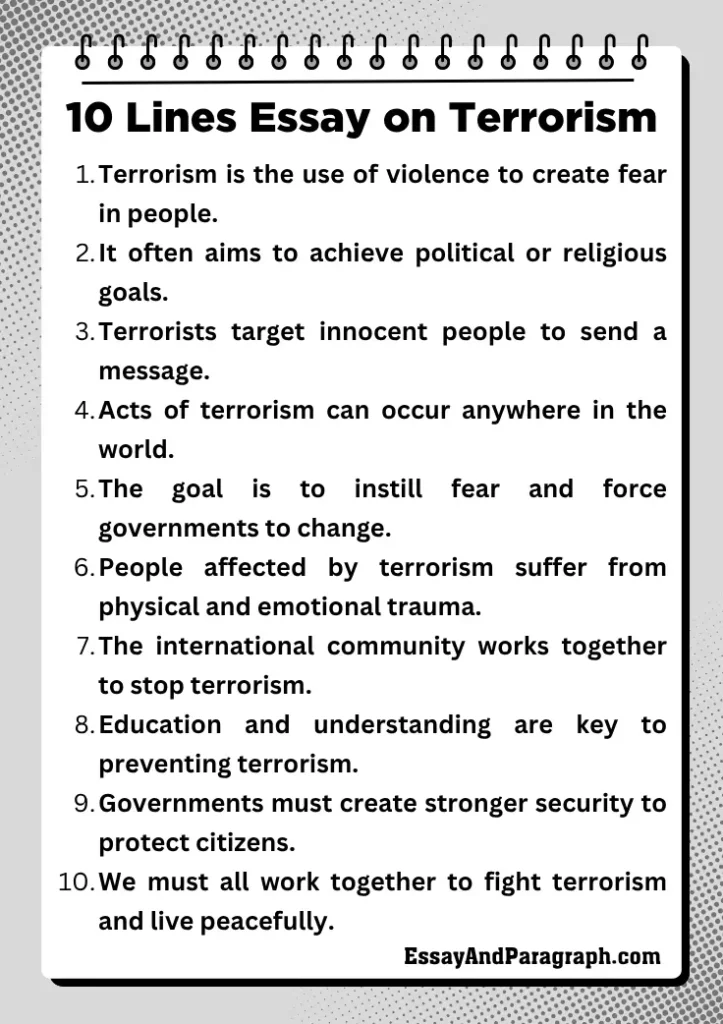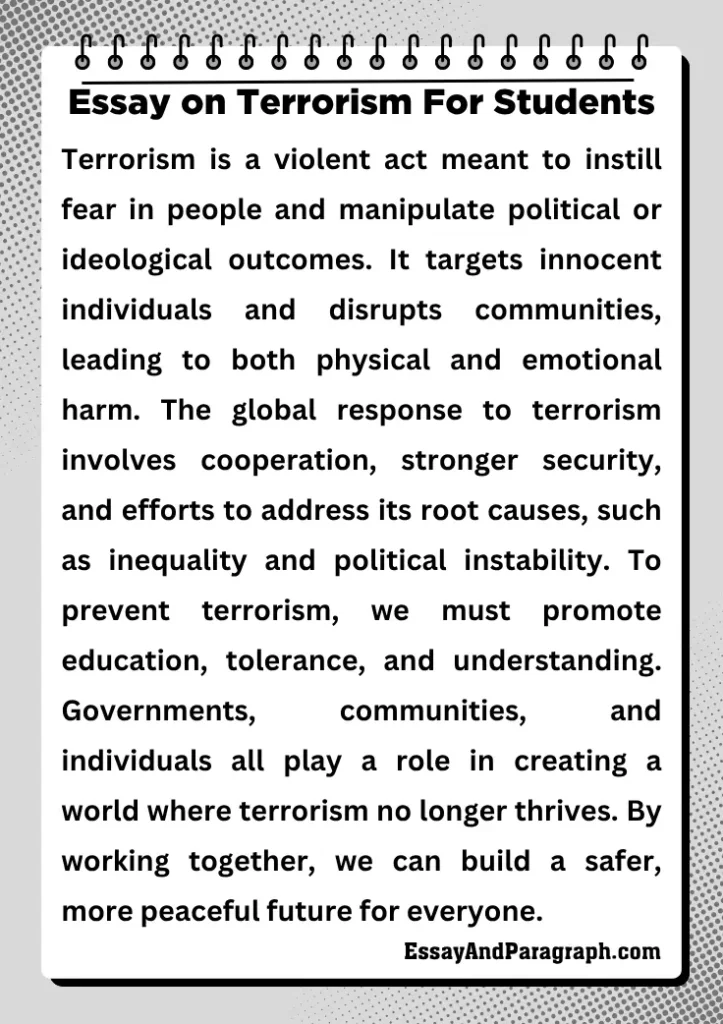Have you ever wondered what terrorism really means and how it impacts people worldwide? Terrorism is an act of violence intended to create fear and manipulate others for political or ideological purposes. Unfortunately, it affects countless lives and changes the course of history. In this article, we will learn how to write an essay on terrorism, its causes, effects, and how we can work toward a peaceful future.
10 Lines Essay on Terrorism
Terrorism is the use of violence to create fear in people.
It often aims to achieve political or religious goals.
Terrorists target innocent people to send a message.
Acts of terrorism can occur anywhere in the world.
The goal is to instill fear and force governments to change.
People affected by terrorism suffer from physical and emotional trauma.
The international community works together to stop terrorism.
Education and understanding are key to preventing terrorism.
Governments must create stronger security to protect citizens.
We must all work together to fight terrorism and live peacefully.

Short Essay on Terrorism – 100 words
Terrorism is a violent act intended to cause fear among people and force them to follow a particular ideology or belief. It involves harming innocent individuals to achieve political or religious aims. Terrorist groups often target large populations to create widespread panic. This violence has devastating effects, as it leaves physical injuries and emotional scars on people. Governments worldwide are working together to prevent terrorism by improving security and promoting peace. Educating people about the harms of terrorism and fostering understanding is crucial in building a safer world. It is everyone’s responsibility to help stop terrorism and create harmony.
Short Essay on Terrorism – 150 words
Terrorism refers to violent acts intended to create fear and force political, religious, or ideological change. These attacks often target innocent civilians to send a message. The main goal of terrorism is not just physical harm but to instill fear within a society, causing emotional and psychological trauma. This fear affects the stability of communities, disrupts daily life, and strains national resources. Terrorist groups aim to manipulate governments or societies into changing their policies or beliefs. The effects of terrorism can be long-lasting, not only for the victims but also for the entire world, as the ripple effects of violence reach global communities. Governments, organizations, and communities must collaborate to prevent such acts. Increasing awareness, enhancing security, and promoting peaceful dialogue are key steps in building a safer and more stable world.
Short Essay on Terrorism – 200 words
Terrorism is a term used to describe violent acts meant to cause fear and force political, religious, or ideological change. Terrorists target innocent people and often use these attacks to send a strong message or demand certain changes in society. The emotional and psychological impacts of terrorism are immense, not only for the direct victims but also for the families, communities, and nations involved. People live in fear, and communities often become fractured as a result of such violence. These acts of terror can have long-term consequences, affecting both the emotional and economic stability of a country.
Governments across the globe have been working together to address the growing threat of terrorism. Efforts to combat terrorism include strengthening security measures, sharing intelligence, and developing policies aimed at preventing radicalization. Education and community engagement are essential to reduce the appeal of extremist ideologies, making people more resilient to terrorism’s influence. Ultimately, fighting terrorism is a global effort, and creating a peaceful society relies on cooperation, understanding, and dialogue among nations and their citizens.
Short Essay on Terrorism – 250 words
Terrorism refers to violent acts intended to create fear and force political or ideological changes. These violent events often target innocent civilians to achieve specific objectives, and their goal is not only physical harm but psychological terror. Terrorism seeks to disrupt the stability of society by creating fear and anxiety among its people. The emotional and social consequences of terrorism are far-reaching. Victims experience physical injuries, while others deal with long-lasting emotional trauma. Entire communities are affected, as fear and distrust spread.
The world has witnessed the destructive power of terrorism in various forms, from bombings to armed attacks. Terrorist groups use these methods to manipulate governments or societies into changing policies or beliefs that align with their ideology. Terrorism can cause widespread panic, instability, and economic downturns, affecting not just the immediate victims but entire nations.
Combating terrorism requires a multifaceted approach. Governments work together, sharing intelligence and developing stronger security measures. However, security alone cannot prevent terrorism; addressing the root causes of violence, such as poverty, inequality, and political oppression, is crucial. Education plays a significant role in preventing radicalization by promoting understanding, tolerance, and peaceful dialogue. Societies must focus on creating an environment where terrorism does not thrive. Only through cooperation, global efforts, and strong communities can we hope to combat terrorism and build a safer, peaceful world for future generations.
Long Essay on Terrorism – 500 words
Terrorism is a violent act carried out to instill fear and force people or governments to change their policies. It often targets innocent civilians with the aim of achieving political, religious, or ideological objectives. The consequences of terrorism are widespread and devastating, as it affects not only the victims but also the communities and nations involved.
The emotional impact of terrorism is profound. Those directly affected by these acts of violence face physical injuries, while their emotional and psychological well-being is often scarred for life. Families lose loved ones, communities live in fear, and entire societies are destabilized. The goal of terrorism is not just to harm but to send a message—one that creates fear and forces change.
Terrorist acts can happen anywhere. In recent years, we have seen attacks in both developed and developing countries, making it clear that no place is completely safe. Whether it’s a bomb explosion, an armed attack, or a hijacking, these events are designed to disrupt daily life and force governments to react. However, this reaction is often met with increased security measures, which can infringe on personal freedoms and cause further societal disruption.
The international community has a critical role to play in countering terrorism. Countries around the world cooperate through organizations like the United Nations to share intelligence and work together to track down and dismantle terrorist organizations. However, combating terrorism requires more than just military and law enforcement action. Education, economic development, and political reform are key factors in addressing the root causes of terrorism.
Preventing terrorism is a global challenge, but it can be done. Governments must strengthen security measures while ensuring that they do not undermine civil liberties. Communities need to come together to promote understanding and tolerance, making it harder for extremist ideologies to take hold. By supporting peaceful dialogue and cooperation, we can reduce the appeal of violent ideologies and create a more peaceful world.
The future outlook on terrorism remains uncertain, but with global cooperation and efforts to address the underlying causes of violence, we can hope for a safer and more secure future. Everyone, from world leaders to everyday citizens, has a role to play in this fight. By promoting education, tolerance, and understanding, we can prevent terrorism and build a peaceful world for future generations.
FAQs: Essay on Terrorism
1. What is terrorism?
Terrorism refers to violent acts that are intended to cause fear and force people or governments to change. These acts often target innocent civilians and are carried out by individuals or groups with specific political, religious, or ideological goals. Terrorists use violence to send a message, disrupt societies, and achieve their objectives, whether it’s through bombings, shootings, or other attacks. The emotional and social impact of terrorism is widespread and long-lasting.
2. How does terrorism affect society?
Terrorism has a significant emotional, social, and economic impact on society. It causes fear and anxiety, making people feel unsafe in their daily lives. Victims of terrorism suffer both physically and emotionally, often leading to long-term trauma. Communities are torn apart, and nations face economic consequences as tourism and business activities decline. Additionally, governments are forced to increase security measures, which can lead to restrictions on personal freedoms and civil rights.
3. What are the causes of terrorism?
Terrorism is often driven by complex factors such as political grievances, social injustice, and ideological beliefs. Many terrorist groups form as a response to perceived oppression, corruption, or a lack of opportunities. Poverty, inequality, and social marginalization also contribute to the radicalization of individuals. In some cases, religious or ethnic tensions fuel terrorism as groups seek to assert their identity or gain power.
4. How can terrorism be prevented?
Preventing terrorism requires a multifaceted approach. Governments must strengthen security measures, but they should also address the root causes of terrorism, such as poverty, inequality, and political instability. Education and community engagement play a vital role in reducing the appeal of extremist ideologies. By promoting understanding, tolerance, and peaceful dialogue, societies can reduce the chances of radicalization. International cooperation and intelligence sharing are also essential in tracking and disrupting terrorist activities.
5. What are the global efforts to combat terrorism?
Countries around the world are working together to combat terrorism through international organizations like the United Nations and INTERPOL. These organizations help to share intelligence, coordinate counter-terrorism efforts, and support the rebuilding of nations affected by terrorism. Additionally, countries have adopted various security measures, such as improving airport security and monitoring online activities, to prevent terrorist attacks. Diplomacy, human rights protection, and humanitarian aid are also part of the global response to terrorism.
6. How do terrorist groups recruit individuals?
Terrorist groups often recruit individuals through propaganda, social media, and personal connections. They exploit feelings of anger, frustration, and disillusionment, offering a sense of purpose or belonging to those who feel marginalized. Recruiters target vulnerable individuals who may have experienced personal loss, social injustice, or political oppression. Once recruited, these individuals are radicalized and taught to carry out violent acts in the name of the group’s cause.
Top 5 Quotes on Terrorism
“The only way to deal with this threat is to tackle the root causes of terrorism.” – Kofi Annan
“Terrorism is a disease that must be fought by a cooperative effort by all people.” – Barack Obama
“In the face of terrorism, we stand united and determined.” – Angela Merkel
“Terrorism is an act of war against humanity.” – Ban Ki-moon
“We must fight terrorism not with fear, but with the strength of unity and understanding.” – Malala Yousafzai

Summary : Essay on Terrorism
Terrorism is a violent act meant to instill fear in people and manipulate political or ideological outcomes. It targets innocent individuals and disrupts communities, leading to both physical and emotional harm. The global response to terrorism involves cooperation, stronger security, and efforts to address its root causes, such as inequality and political instability. To prevent terrorism, we must promote education, tolerance, and understanding. Governments, communities, and individuals all play a role in creating a world where terrorism no longer thrives. By working together, we can build a safer, more peaceful future for everyone.



